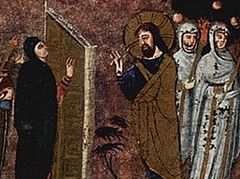Now when Jesus was in Bethany, in the house of Simon the leper, there came unto Him a woman having an alabaster box of very precious ointment, and poured it on His head, as he sat at meat. But when His disciples saw it, they had indignation, saying, "To what purpose is this waste? For this ointment might have been sold for much, and given to the poor." When Jesus understood it, He said unto them, "Why trouble ye the woman? for she hath wrought a good work upon Me. For ye have the poor always with you; but Me ye have not always. For in that she hath poured this ointment on My body, she did it for My burial. Verily I say unto you, Wheresoever this gospel shall be preached in the whole world, there shall be also this, that this woman hath done, be told for a memorial of her." Then one of the twelve, called Judas Iscariot went unto the chief priests, and said unto them, "What will ye give me, and I will deliver Him unto you." And they covenanted with him for thirty pieces of silver. And from that time he sought opportunity to betray Him.
Matthew 26:6-16
 Hieromonk Seraphim (Rose) In this passage of Scripture, we read how, as our Lord prepared for His Passion, a woman came and anointed Him with very precious ointment; and it is very touching how our Lord accepted such love from simple people. But at the same time Judas—one of the twelve who were with Him—looked at this act, and something in his heart changed. This was apparently the “last straw,” because Judas was the one in charge of the money and he thought that this was a waste of money. We can even see the logical processes going on in his mind. We can hear him think about Christ: “I thought this man was somebody important. He wastes money, he doesn’t do things right, he thinks he’s so important…” and all kinds of similar little ideas which the devil puts in his mind. And with his passion (his main passion was love of money), he was caught by the devil and made to betray Christ. He did not want to betray Him; he simply wanted money. He did not watch over himself and crucify his passions.
Hieromonk Seraphim (Rose) In this passage of Scripture, we read how, as our Lord prepared for His Passion, a woman came and anointed Him with very precious ointment; and it is very touching how our Lord accepted such love from simple people. But at the same time Judas—one of the twelve who were with Him—looked at this act, and something in his heart changed. This was apparently the “last straw,” because Judas was the one in charge of the money and he thought that this was a waste of money. We can even see the logical processes going on in his mind. We can hear him think about Christ: “I thought this man was somebody important. He wastes money, he doesn’t do things right, he thinks he’s so important…” and all kinds of similar little ideas which the devil puts in his mind. And with his passion (his main passion was love of money), he was caught by the devil and made to betray Christ. He did not want to betray Him; he simply wanted money. He did not watch over himself and crucify his passions.
Anyone of us can be exactly in that position. We have to look at our hearts and see which passion of ours will be devil hook us on in order to cause us to betray Christ. If we think that we are something superior to Judas—that he was some kind of a “kook” and we are not—we are quite mistaken. Like Judas, everyone of us has passions in his heart. Let us therefore look at them. We can be caught with love for neatness, with love for correctness, with love for a sense of beauty: any of our little faults which we cling to can be a thing that the devil can catch us with. Being caught, we can begin to justify this condition “logically”—on the basis of our passion. And from that “logical” process of thinking we can betray Christ, unless we watch over ourselves and begin to realize that we are filled with passions, that each one of us is potentially a Judas. Therefore, when the opportunity comes—when the passion begins to operate in us and logically begins to develop from a passion into betrayal—we should stop right there and say, “Lord, have mercy on me, a sinner!”
We must not look at life through the glasses of our passions, nor see how we can “fit” life into being what we would like it to be—whether this is a life where there is peace and quiet or where there is a lot of noise and excitement. If we try to make life “fit” like this, a total disaster will result. In looking at life, we should accept all the things which come to us as God’s providence, knowing that they are intended to wake us up from our passions. We should pray to God to show us some God-pleasing thing that we can do. When we accept what comes to us, we begin to be like the simple woman in the Gospel who heard the call from God and was thus able to be His minister. She was proclaimed to the ends of the world, as our Lord says, because of the simple thing she did—pouring out the ointment upon Him. Let us be like her: sensitive to watching God’s sings around us. These signs come from everywhere: from nature, from our fellow men, from a seeming chance of events… There is always, everyday, something that indicates to us God’s will. We must be open to this.
Once we become more aware of the passions within ourselves and begin to fight against them, we will not let them begin the process which was seen in Judas. Judas started from a very small thing: being concerned for the right use of money. And from such small things we betray God the Saviour. We must be sober, seeing not the fulfillment of our passions around us, but rather the indication of God’s will: how we might this very moment wake up and begin to follow Christ to His Passion and save our souls.



